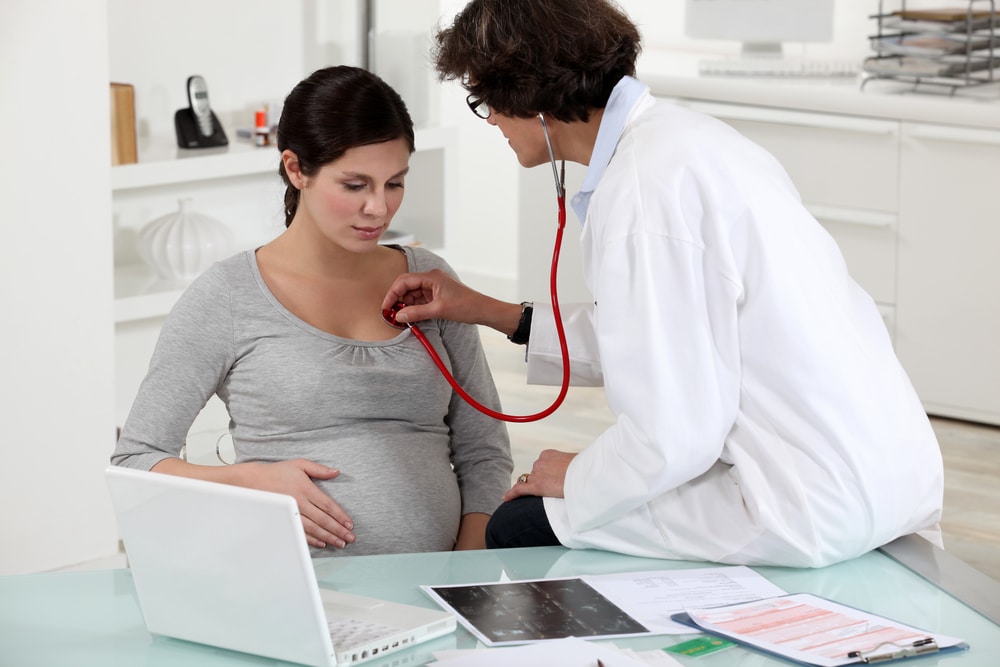There are many things to worry about when you are pregnant. One of which can occur when you have hit the twenty week mark. This is Gestational hypertension, or high blood pressure caused by your pregnancy. This affects about eight percent of women who are pregnant in their first pregnancy. Women who are over the age of forty are at higher risk, as well as ladies who are overweight or carrying twins. Gestational hypertension is when your blood pressure is higher at least fifteen degrees than your normal range. Or if your blood pressure is 130/90 mm Hg or higher. Gestational hypertension is nothing to get too worried about, as long as you keep up your prenatal care your doctor will be able to take care of it. If you had hypertension before becoming pregnant than you may develop chronic hypertension this too can be managed by your doctor as long as you make sure you are being taken care of appropriately.Â
Gestational hypertension sometimes has no other symptoms than your blood pressure being elevated. Meaning that you may not know you have this until you go to the doctor and they check your blood pressure. There are sometimes other symptoms that can give you a clue if you have hypertension. If you experience consistent headaches, edema, sudden weight gain, vision changes, or nausea. Between these and once your doctor checks your blood pressure then they will know if you have gestational hypertension. Â
There sometimes is no intervention needed with gestational hypertension. Your doctor will monitor you and make sure that you are in good health even if your blood pressure is high. Sometimes if it is too increased your doctor may suggest some blood pressure medication. Some blood pressure medication is alright to take while pregnant, your doctor will know what to prescribe you. The main thing is to make sure you keep up with your prenatal care. Â
Sometimes though there is no effect from gestational hypertension, it can lead to some complications. It can lead to decreased blood flow to the placenta which can cause low birth weight of the baby. If can also lead to premature birth. Another condition that gestational hypertension can cause is placental abruption. This is when your placenta separates from the uterine wall. This can cause heavy bleeding that can be fatal to you and your baby. Â
Another thing is preeclampsia. This is when you develop hypertension with signs of organ damage. Organ damage that can occur is kidney damage, liver, blood or brain. Though gestational hypertension can lead to preeclampsia the cause of preeclampsia is unknown. If your doctor suspects you may suffer from preeclampsia, they will test your urine for high levels of protein, and if you have high blood pressure as well. Some symptoms of preeclampsia are protein in your urine, kidney problems, severe headaches, loss or blurred vision, light sensitivity, upper abdominal pain, nausea, vomiting, and shortness of breath.  Usually delivering your baby will cure preeclampsia. Your doctor may take this into consideration in telling you to deliver after thirty seven weeks if they feel it is healthier for you and your baby. After birth symptoms will usually go away. If they don’t you may have postpartum preeclampsia. This can become very serious and you will need treatment for this right away. Preeclampsia occurs in about one in twenty pregnancies. If preeclampsia if not treated it can turn into eclampsia which can lead to you going into a coma or even die. Make sure you get appropriate prenatal care for yourself. Â
Gestational hypertension can cause into something but it doesn’t always. Your doctor will monitor you closely, and may want to see you for more visits up to your due date. If your hypertension gets too extreme that it is causing you or your baby distress your doctor may want to deliver earlier than your due date. If you are not close to your due date and your hypertension is extreme, your doctor may suggest you go on bed rest to make sure that you aren’t over exerting yourself too much. Make sure you exercise regularly, and eat healthy this can help lower your blood pressure. Take your medication if your doctor ends up prescribing medication for your. Â
If you have gestational hypertension after you give birth it usually goes away. Your blood pressure should return back to normal. Though having gestational hypertension can put you more at risk for high blood pressure later on in your life. You will be able to breastfeed if that was your choice before. Besides the timing of your delivery, there should be no complications during your delivery, your doctor will monitor your blood pressure and the baby to make sure that neither of you are at risk while delivering. Â
Gestational hypertension though it may not lead to anything to extreme it can have complications. Make sure you keep up with all your prenatal care and appointments. Your doctor monitoring you and your baby will be important in keeping both of you healthy and safe through that last weeks of your pregnancy. Â
Blood Pressure & Pregnancy Be Aware of Changes #HealthStatus
Sources:
https://medlineplus.gov/highbloodpressureinpregnancy.html
https://www.mayoclinic.org/healthy-lifestyle/pregnancy-week-by-week/in-depth/pregnancy/art-20046098
https://www.webmd.com/baby/potential-complication-gestational-hypertension#2








Reply